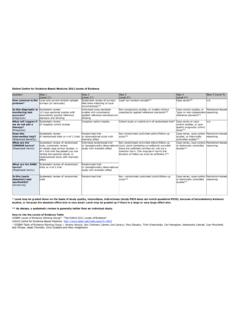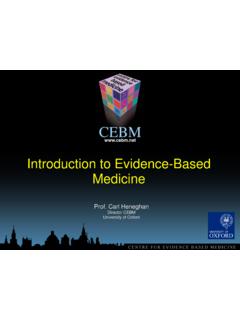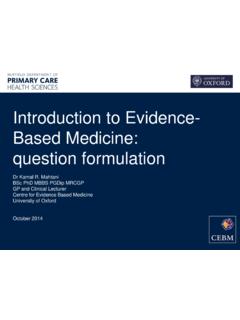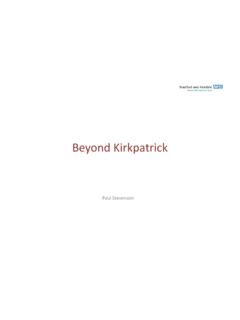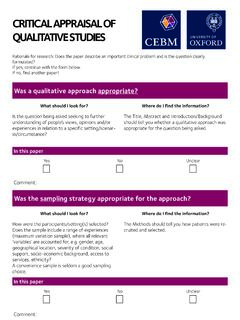Transcription of Defining Value-based Healthcare in the NHS
1 Value-based Healthcare is the equitable, sustainable and transparent use of the available resources to achieve better outcomes and experiences for every person. Defining Value-based Healthcare in the NHS Centre for Evidence- based Medicine Report 2019/04 Defining Value-based Healthcare in the NHS: CEBM report 1 Defining Value-based Healthcare in the NHS Hurst L, Mahtani K, Pluddemann A, Lewis S, Harvey K, Briggs A, Boyle A, Bajwa R, Haire K, Entwistle A, Handa A and Heneghan C CEBM, University of Oxford Report Authors Louise Hurst - Senior Associate Tutor and Research Fellow, Centre for Evidence- based Medicine, Nuffield Department of Primary Care Health Sciences, University of Oxford Dr Kamal Mahtani - GP and Associate Professor of Evidence- based Medicine.
2 Nuffield Department of Primary Care Health Sciences, University of Oxford Dr Annette Pluddemann - Senior Research Fellow Centre for Evidence- based Medicine, Nuffield Department of Primary Care Health Sciences, University of Oxford Dr Sally Lewis - National Clinical Lead for Value-based and Prudent Healthcare , Aneurin Bevan UHB and Honorary Professor, Swansea University Medical School Kate Harvey - Service Director - Children, Young People and, Dorset Healthcare University NHS Foundation Trust Dr Adam Briggs - Public Health Specialty Registrar, the Health Foundation Dr Anne-Marie Boylan - Departmental Lecturer and Senior Research Fellow NIHR CLAHRC Oxford, Nuffield Department of Primary Care Health Sciences, University of Oxford Dr Raj Bajwa - GP and Chair, NHS Buckinghamshire CCG Dr Kate Haire - Clinical Director, Guy's Cancer and Partners.
3 SEL Accountable Cancer Network and Joint Clinical Chair SEL Cancer Alliance Andrew Entwistle - PPI contributor Professor Ashok Handa - Director of Surgical Education, Associate Professor in Vascular Surgery, Consultant Vascular Surgeon and Training Programme Director (Vascular Surgery), Nuffield Department of Surgical Sciences, University of Oxford Professor Carl Heneghan - Professor of Evidence- based Medicine and Director, Centre for Evidence- based Medicine, Nuffield Department of Primary Care Health Sciences, University of Oxford How to cite: Hurst L, Mahtani K, Pluddemann A, Lewis S, Harvey K, Briggs A, Boyle A, Bajwa R, Haire K, Entwistle A, Handa A and Heneghan C.
4 Defining Value-based Healthcare in the NHS: CEBM report. Defining Value-based Healthcare in the NHS: CEBM report 2 Foreword Evidence- based medicine describes the need for the more thoughtful identification and compassionate use of individual patient s predicaments, rights, and preferences in making clinical decisions about their care. 1 1997 saw the Centre for Evidence- based Medicine publish both Evidence- based Medicine, How To Practice and Teach It 2 and Evidence- based Healthcare , How To Make Health Policy and Management Decisions.
5 3 The latter used the term value based Healthcare for the first time in its second edition in 2001, 4 emphasising those who pay for Healthcare will require that interventions are provided only when their outcomes give greater benefits than any other alternative use of resources. The Centre has, over the years, demonstrated and advocated against the potential harms of too much medicine 5 and poor regulation of treatments 6 and research. 7 It has used evidence to show where Healthcare resources may be wasted ( , Tamiflu 8) and costs could be saved ( open prescribing 9).
6 All of these examples show how evidence can be used to increase value in the use of Healthcare resources. Shortly after the Centre was established, the election of the Tony Blair government in 1997 led to a decade of unprecedented growth in NHS investment. Decision makers found all the pressure was off. It was not until the culture change induced by the Lehman Brothers collapse in 2008 that population value became an explicit element in decision making. Today, up-to-date decision-making in health care around the world must consider value as well as evidence.
7 Evidence- based medicine and evidence- based Healthcare have been two sides of the same coin for twenty years. So, too, are personal value and population value . value for a population is determined by both the allocation and the use of resources to optimise health and minimise inequity. This report explores the key issues and brings together both evidence and value in decision making. Sir Muir Gray Oxford March 2019 Defining Value-based Healthcare in the NHS: CEBM report 3 Table of Contents Contents Summary.
8 3 Seven Key recommendations .. 4 Why do we need to define Value-based Healthcare for the NHS? .. 6 Our approach .. 7 1. Meaning of value in the NHS .. 7 What do we mean by Value-based Healthcare in the NHS? .. 8 2. The key challenges and barriers to Value-based Healthcare in the NHS .. 9 3. Skills and training needed to deliver Value-based Healthcare .. 10 Conclusion .. 11 References .. 12 Summary value is gaining prominence in Healthcare systems facing increased demand for services with limited resources.
9 However, Value-based Healthcare has not yet been embraced as part of the everyday language and business of the NHS in the way that evidence- based Healthcare has. The absence of an agreed definition of Value-based Healthcare in the NHS, the lack of skills required to deliver Value-based Healthcare and a clear understanding of the barriers to effective development and implementation inhibits the health system in addressing problems such as overdiagnosis, too much medicine, poor allocation of resources and the introduction of inadequately evidenced technologies This report sets out a route to Defining Value-based Healthcare in the NHS.
10 An assessment of the barriers to its development, and an understanding of what skills and training would support implementation. A stakeholder workshop informs the report with patients and leaders across the NHS and value sector. Value-based Healthcare is the equitable, sustainable and transparent use of the available resources to achieve better outcomes and experiences for every person. Defining Value-based Healthcare in the NHS: CEBM report 4 Seven Key recommendations For patients and professionals in the NHS who are interested in increasing value at a local or national level: 1.
